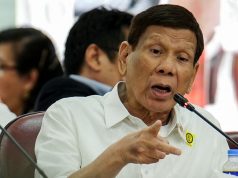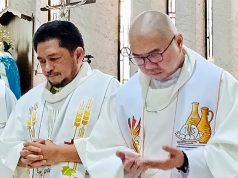MANILA, Philippines – Do extra-judicial killings happen in the Philippines?
It appears that the highest leader of the land is in a quandary over the sensitive issue being linked to his war on drugs campaign as he said during the earlier part of his speech on Thursday, Oct. 19, that there were no EJKs in the Philippines but then said that there were in the latter part of his talk during the 43rd Business Conference and Expo held at the Manila Hotel.
“There’s no such thing as extrajudicial killing in this country. Because if you use that definition, then there will be less conviction and more acquittal,” President Rodrigo Duterte first said.
The chief executive explained that the country’s “fundamental crimes as defined in the Revised Penal Code,” which was “left to us by the Spaniards” and was not changed by the Americans when they colonized the country, did not include EJKs.
“That is what we got from the colonizers. That is why we do not even know how to define extrajudicial killing. There is no such animal here,” said Duterte.
“And other countries cannot force that term on us because we are a sovereign nation, we have a Constitution,” he said.
“Now, extrajudicial killing is simply homicide or murder. Period,” the President added.
Yes, there are EJKs
But later on in his speech, while he was discussing about the case of Grade 11 student Kian Loyd delos Santos, who died in the hands of the police during an anti-illegal drug operation in Caloocan City on August 16, the President apparently contradicted himself by saying there were EJKs.
“Now, are there extra-judicial killings? Yes. And that is why from the day I saw the TV, I ordered the police to detain the three policemen until today and they are facing charges of murder,” Duterte said.
Earlier this month, the Philippine National Police (PNP) said there were no EJKs under the Duterte administration. This earned criticisms from local and international human rights groups, with Human Rights Watch (HRW) calling the claim “ridiculous.”
Convenient, limited EJK definition?
HRW-Geneva director John Fisher assailed the police for using a “convenient” definition of EJK based on Administrative Order No. 35, which was issued during the previous administration.
The order defines EJK as killings wherein “the victim was a member of, or affiliated with an organization, to include political, environmental, agrarian, labor, or similar causes; or an advocate of above-named causes; or a media practitioner or person(s) apparently mistaken or identified to be so.”
But according to Fisher, “The definition of extra-judicial killings is not up to the government. It’s a matter of international law. It stems from something as basic as right to life which is found in the universal declaration of human rights.”
The Commission on Human Rights (CHR) also criticized the PNP’s “limited” definition of EJK. It said basing EJK’s definition on A.O. 35 “would discount killings that are also perpetrated by state agents and non-state actors that remain uninvestigated.”
The commission said EJK’s definition should be based on the explanation made by Philip Alston.
According to the former UN special rapporteur EJK “encompasses any killing by government forces as well as killings by any other groups or individuals which the government fails to investigate, prosecute, and punish when it is in a position to do so.”
‘No EJK, it’s not in our Charter’
Presidential Communications Secretary Martin Andanar took up the cudgels for the PNP.
“We do not have judicial killing, we do not have capital punishment. It is prohibited to kill in our country. So why is there extrajudicial killing when there is no judicial killing? Why put ‘extra?’ So there is no extrajudicial killings in our country. There is no judicial killing, it is not state sponsored, it is not legal, it is not in our Constitution,” said Andanar.
Meanwhile, the Social Weather Stations this month came out with its survey results showing that seven in 10 Filipinos are worried that they themselves or someone they know will become a victim of EJK.
In another survey released by Pulse Asia earlier this week, 73 percent of the respondents said they believe the allegations that EJKs are taking place in the course of the implementation of the administration’s war on drugs campaign.









